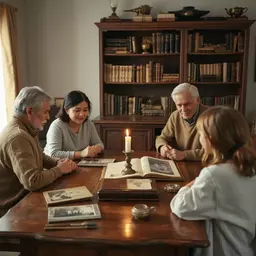Documenting Your Family History Steps
Have you ever considered how much your family's history shapes your identity? Documenting your family history is not just a nostalgic project; it's a profound way to preserve your heritage and connect with future generations. This guide will equip you with the practical steps to begin this rewarding journey.
What You Will Learn
- The significance of documenting family history to connect generations and preserve cultural heritage.
- How to gather initial family data by engaging with relatives and utilizing existing family records.
- The process of creating a family tree using either paper templates or digital platforms for easy organization.
- Strategies to overcome common challenges in genealogy, such as conflicting records and information gaps.
- The importance of involving family members in the research process to foster collaboration and strengthen bonds.
- Resources available for ongoing research, including online databases, forums, and local historical societies.
- Tips for inviting family contributions and feedback to enrich your family narrative.
Key Steps in Documenting Your Family History
Documentation of family history involves various steps that can help in organizing and understanding the lineage. Below is a clear representation of essential tasks in this process. For more insights into how personal narratives can shape your understanding of your heritage, explore our tips on crafting stories from life events.
1. Gather Initial Information
Start with personal data from family members, including names, birth dates, and places of residence.
2. Utilize Existing Family Records
Review family documents such as Bibles, photographs, letters, and legal documents that may contain valuable information.
3. Create a Family Tree
Visualize your research by constructing a family tree that organizes your findings systematically.
5. Involve Family Members
Engage relatives in the research process to strengthen bonds and enrich the narrative with diverse perspectives.
Practical Steps for Documenting Your Family History
Documenting your family history is more than just a fun project; it’s a way to keep your family's stories alive for generations to come. At the Legacy Writers Guild, we understand the importance of weaving these narratives together. Sharing your family history not only connects you with your roots but also fosters a sense of belonging. It’s like holding a thread that ties past, present, and future together.
Understanding the Importance of Family History Documentation
Why should we care about our family history? Well, each family has a unique story that shapes who we are today. Understanding where we come from can offer insights into our identity and values. By documenting these histories, we can connect generations and ensure our ancestors' legacies live on. To learn more about preserving your unique narrative, explore how you can benefit from fiction writing courses for seniors.
Why Family History Matters in Connecting Generations
Family history serves as a bridge, linking the past to the present. It helps us understand our ancestors’ struggles, triumphs, and traditions. Here are some reasons why it matters:
- Preservation of Heritage: It keeps cultural traditions alive.
- Strengthens Bonds: Sharing stories can bring families closer together.
- Legacy of Learning: It offers life lessons that can inspire future generations.
Gathering Initial Information: Where to Begin
Starting your family history project can feel overwhelming, but the journey is exciting! The key is to begin with what you know. Start by gathering information from family members. This step is crucial as it lays the groundwork for your research.
Collecting Personal and Immediate Family Data
Begin by jotting down the details of your immediate family. Write down names, birth dates, and places where they lived. Also, consider these points:
- Gather information from your parents and grandparents.
- Ask about family traditions and stories.
- Document any family heirlooms or significant items that could hold stories.
Utilizing Existing Family Records and Documents
Next, take a look at existing family records. These can include:
- Bibles or family bibles
- Old photographs
- Letters or diaries
- Any legal documents like wills or land deeds
Each piece of information can serve as a clue on your journey to uncovering your family history!
Exploring Your Heritage: The Role of Ethnic Heritage Studies
Diving into your ethnic heritage can be a fascinating avenue. Understanding the cultural background of your family can enrich your narrative. Consider researching the customs, traditions, and histories of your ancestors’ homelands. This exploration can add depth to your family history and help you celebrate your unique identity.
Creating a Family Tree: The Foundation of Your Research
Once you’ve gathered initial information, creating a family tree is a fantastic way to visualize your research. It helps organize the data you’ve collected and can serve as a roadmap for further exploration. For creative ideas on how to weave these findings into compelling narratives, consider exploring creative writing ideas for seniors.
Choosing Between Paper Templates and Digital Platforms
You have options when it comes to creating your family tree. You can choose between:
- Paper templates: Ideal for those who enjoy hands-on projects.
- Digital platforms: Convenient for easy updates and online sharing.
Both methods can help you create a meaningful representation of your family lineage!
Exploring Popular Genealogy Software Options
There are also many genealogy software options available to help you in your quest. Some popular choices include:
- Family Tree Maker
- Ancestry.com
- MyHeritage
- Legacy Family Tree
Each program has its unique features, so exploring them can help you find the right fit for your needs.
Pros and Cons of Various Family Tree Tools
As you consider which tools to use, it’s essential to weigh the pros and cons. For instance:
- Paper Templates: Accessible and personal, but may require more maintenance.
- Digital Software: Easy to update and share, but can involve a learning curve.
Choose a method that resonates with your style and makes the process enjoyable!
Using Family Group Sheets to Organize Information
Family group sheets are handy tools when documenting families. They help organize information about parents, children, and their relationships. With these sheets, you can efficiently track details and visualize family connections.
As you embark on this beautiful journey of documenting your family history, remember that it’s about more than just facts—it's about preserving the essence of your family for future generations. At the Legacy Writers Guild, we believe that every story matters and look forward to seeing how you bring your family's narrative to life!
Pro Tip
When documenting your family history, consider incorporating multimedia elements such as audio or video recordings of family interviews. This not only preserves the stories in their original voices but also adds a rich layer of emotion and authenticity to your narratives.
Frequently Asked Questions About Documenting Family History
- Why is documenting family history important?
- Documenting family history helps preserve cultural heritage, connects generations, strengthens family bonds, and provides life lessons that inspire future generations.
- How do I start gathering initial information for my family history project?
- Begin by collecting personal data from immediate family members, including names, birth dates, and places of residence. Also, review existing family records like Bibles, photographs, letters, and legal documents.
- What are the main ways to create a family tree?
- You can create a family tree using either paper templates for a hands-on approach or digital platforms like Family Tree Maker, Ancestry.com, or MyHeritage for easier updates and sharing.
- What are common challenges in genealogy research and how can I overcome them?
- Common challenges include conflicting records and information gaps. Overcome these by cross-referencing multiple sources, systematically documenting findings, consulting family members, and utilizing resources like online databases, local archives, and historical newspapers.
- How can I encourage family participation in my genealogy project?
- Engage relatives by hosting family meetings, encouraging them to share personal stories and memories, creating shared documents or online platforms, and organizing collaborative projects like family history books or reunions.
Summarizing Key Steps in Family History Documentation
Documenting family history can feel like a daunting task, but with the right approach, it transforms into a fulfilling journey. As I guide my fellow writers at the Legacy Writers Guild, I often emphasize the importance of organizing your research effectively. This not only simplifies the process but also deepens your understanding of your lineage and connects you with your family’s past.
Throughout this journey, you’ll likely encounter challenges. Don’t worry! By addressing common issues head-on, you can keep moving forward and uncover the rich tapestry of your family history.
Addressing Common Challenges in Genealogy Research
Many researchers face hurdles when diving into their family history. One of the most prevalent challenges includes dealing with conflicting records. Information gaps can emerge due to various reasons, from miscommunications to changes over time. Here are some strategies to help you navigate these challenges:
- Cross-reference multiple sources to verify facts.
- Document your findings systematically to identify discrepancies.
- Consult with family members to gather additional perspectives.
Additionally, resources abound to help overcome research obstacles. Consider using online databases or visiting local archives. Historical newspapers can also provide fascinating insights into your ancestors’ lives! For more on transforming these discoveries into compelling narratives, explore empowering stories: tips for seniors.
Resources for Overcoming Research Obstacles
As you tackle challenges, keep in mind there are numerous resources at your disposal:
- Online genealogy platforms like Ancestry.com and FamilySearch.
- Local libraries or historical societies for access to archives.
- Forums and social media groups focused on genealogy research.
These resources can serve as valuable allies in your journey, guiding you toward valuable information that enriches your family’s narrative.
Encouraging Family Participation in Genealogy Projects
Engaging family members in your research can create a sense of community and shared purpose. At Legacy Writers Guild, we believe collaboration can spark creativity and bring new dimensions to your family story. Here are some ideas for involving your relatives in the research process:
- Host family meetings to discuss findings and gather information.
- Encourage family members to share their personal stories and memories.
- Create a shared document or online platform for everyone to contribute.
By fostering an environment of collaboration, you’ll not only enrich your project but also strengthen family bonds.
Collaborative Family Projects: Sharing Your Research Journey
Consider organizing collaborative projects that allow family members to showcase their findings. For instance, you could:
- Create a family history book that includes contributions from everyone.
- Plan a virtual or in-person presentation to share your discoveries.
- Set up a family reunion focused on celebrating your shared heritage.
These activities can become cherished memories, making the research process even more meaningful and enjoyable. For guidance on structuring these narratives, consider learning about narrative techniques for senior writers.
Next Steps for Continued Research and Exploration
Your family history journey doesn’t have to end here! As you gather information, remember that continued exploration can lead to amazing discoveries. Online genealogy communities are fantastic resources for support and learning.
- Join forums or social media groups dedicated to genealogy.
- Participate in discussions to share insights and seek advice.
- Attend local workshops or webinars to gain new skills.
By connecting with others, you can share knowledge and discover tips that may help you overcome obstacles.
Inviting Feedback and Contributions from Family Members
As you progress in your research, don’t hesitate to invite feedback from family members. Their insights can reveal new perspectives and lead to exciting discoveries. Encourage them to ask questions or share their thoughts on the information you’ve gathered. This collaborative spirit adds depth to your project!
Call to Action: Start Your Family History Journey Today
So, are you ready to embark on your family history journey? Take the first step by gathering what you know about your family and reaching out to relatives. Remember, it’s not just about collecting dates and names; it’s about bringing your family’s stories to life! At Legacy Writers Guild, we believe that every life has a story worth telling. Why not start sharing yours today?
Let’s celebrate our legacies together, creating a tapestry of narratives that will inspire generations to come!
Recap of Key Points
Here is a quick recap of the important points discussed in the article:
- Understanding Family History: Documenting your family history helps preserve cultural heritage and strengthen family bonds.
- Starting Your Research: Begin by gathering information from immediate family members and existing family records.
- Creating a Family Tree: Use paper templates or digital platforms to visualize your research and organize data effectively.
- Navigating Challenges: Cross-reference sources, document findings, and consult family members to overcome research obstacles.
- Encouraging Family Participation: Engage relatives in the research process to create a collaborative environment that enriches the project.
- Continued Exploration: Join genealogy communities, participate in discussions, and attend workshops to enhance your skills and knowledge.






